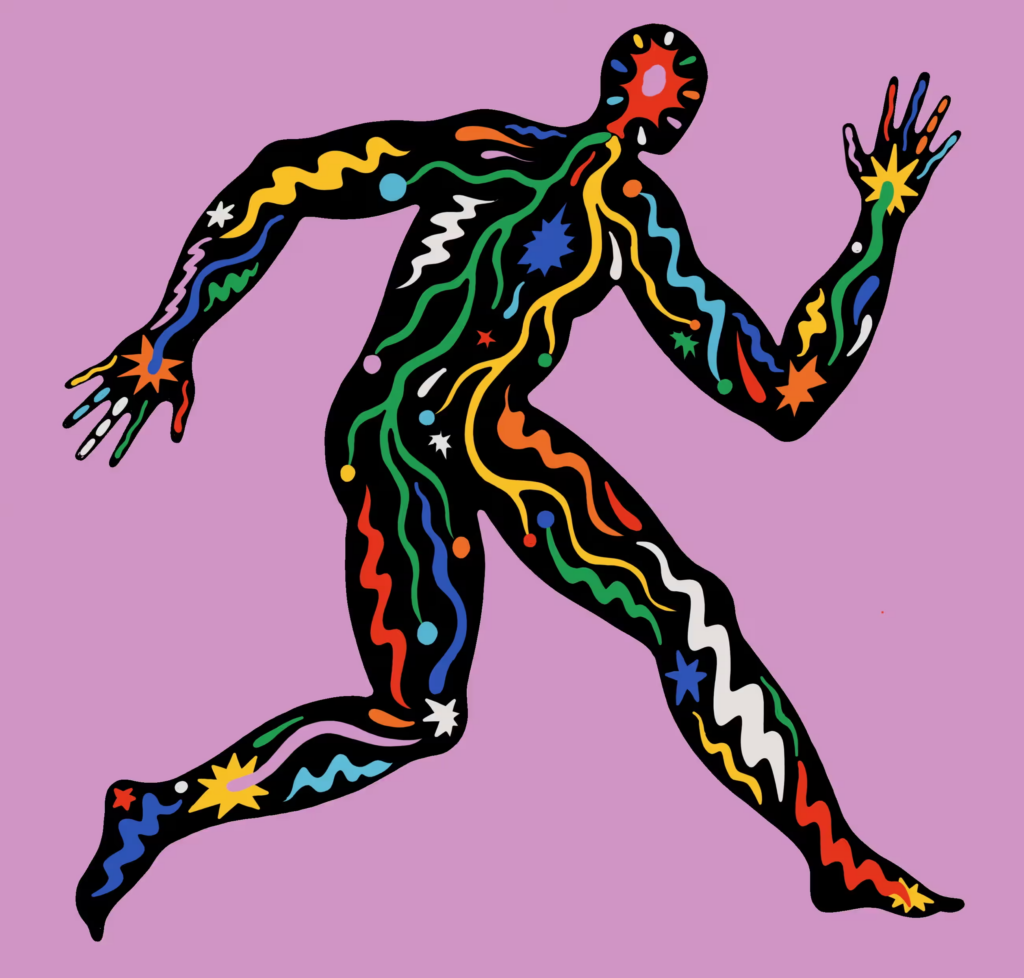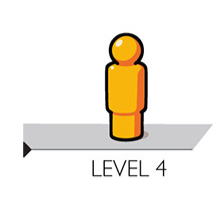Structural insecurity
This fantastic piece by Astra Taylor, whose book The Age of Insecurity is on my to-read list, is sadly behind a paywall. I managed to bypass it, which is why I’m excerpting so much in this post.
What I like is the separation of inequality from insecurity and the difference between existential insecurity from ‘manufactured’ insecurity. Being published in The New York Times, the context is the American economy which largely exists without a social safety net.
The situation is better in the UK/Europe, but we still live in a much more economically precarious world than our parents and grandparents did. And perhaps that’s why everyone’s anxious all of the time.

Since 2020, the richest 1 percent has captured nearly two-thirds of all new wealth globally — almost twice as much money as the rest of the world’s population. At the beginning of last year, it was estimated that 10 billionaire men possessed six times as much wealth as the poorest three billion people on Earth. In the United States, the richest 10 percent of households own more than 70 percent of the country’s assets.Source: Why Does Everyone Feel So Insecure All the Time? | The New York TimesSuch statistics are appalling. They have also become familiar. Since it was catapulted onto the national stage more than a decade ago by Occupy Wall Street, “inequality” has been a frequent topic of conversation in American political life. It helped animate Bernie Sanders’s influential campaigns, reshaped academic scholarship, shifted public policy, and continues to galvanize protest. And yet, however important focusing on the inequality crisis has been, it has also proven insufficient.
If we want to understand contemporary economic life, we need a more expansive framework. We need to think about insecurity. Where inequality encourages us to look up and down, to note extremes of indigence and opulence, insecurity encourages us to look sideways and recognize potentially powerful commonalities.
If inequality can be captured in statistics, insecurity requires talking about feelings: It is, to borrow a phrase from feminism, personal as well as political. Economic issues, I’ve come to realize, are also emotional ones: the spike of shame when a bill collector calls, the adrenaline when the rent or mortgage is due, the foreboding when you think about retirement.
And unlike inequality, insecurity is more than a binary of haves and have-nots. Its universality reveals the degree to which unnecessary suffering is widespread — even among those who appear to be doing well. We are all, to varying degrees, overwhelmed and apprehensive, fearful of what the future might have in store. We are on guard, anxious, incomplete and exposed to risk. To cope, we scramble and strive, shoring ourselves up against potential threats. We work hard, shop hard, hustle, get credentialed, scrimp and save, invest, diet, self-medicate, meditate, exercise, exfoliate.
[…]
Rather than something to pathologize, I want us to see insecurity as an opportunity. We all need protection from life’s hazards, natural or human-made. The simple acceptance of our mutual vulnerability — of the fact that we all need and deserve care throughout our lives — has potentially transformative implications. When we spur people on with insecurity because we expect the worst from them, we create a vicious cycle that stokes desperation and division while facilitating the kind of cutthroat competition and consumption that has brought our fragile planet to a catastrophic brink. When we extend trust and support to others, we improve everyone’s security — including our own.
[…]
Insecurity, after all, is what makes us human, and it is also what allows us to connect and change. “Nothing in Nature ‘becomes itself’ without being vulnerable,” writes the physician Gabor Maté in “The Myth of Normal.” “The mightiest tree’s growth requires soft and supple shoots, just as the hardest-shelled crustacean must first molt and become soft.” There is no growth, he observes, without emotional vulnerability.
The same also applies to societies. Recognizing our shared existential insecurity, and understanding how it is currently used against us, can be a first step toward forging solidarity. Solidarity, in the end, is one of the most important forms of security we can possess — the security of confronting our shared predicament as humans on this planet in crisis, together.
Emoji, we salute you 🫡
I remember going to a conference session about a decade ago when people were still on the fence about emoji and the presenter said that they were the most important form of visual communication since hieroglyphics.
It’s hard to argue otherwise. I’ve been a huge fan since I noticed that adding a smiley to my emails made a huge difference to the way that people received and understood them. It’s a way of communication at a distance; how would we navigate group chats and social networks without them? 😅
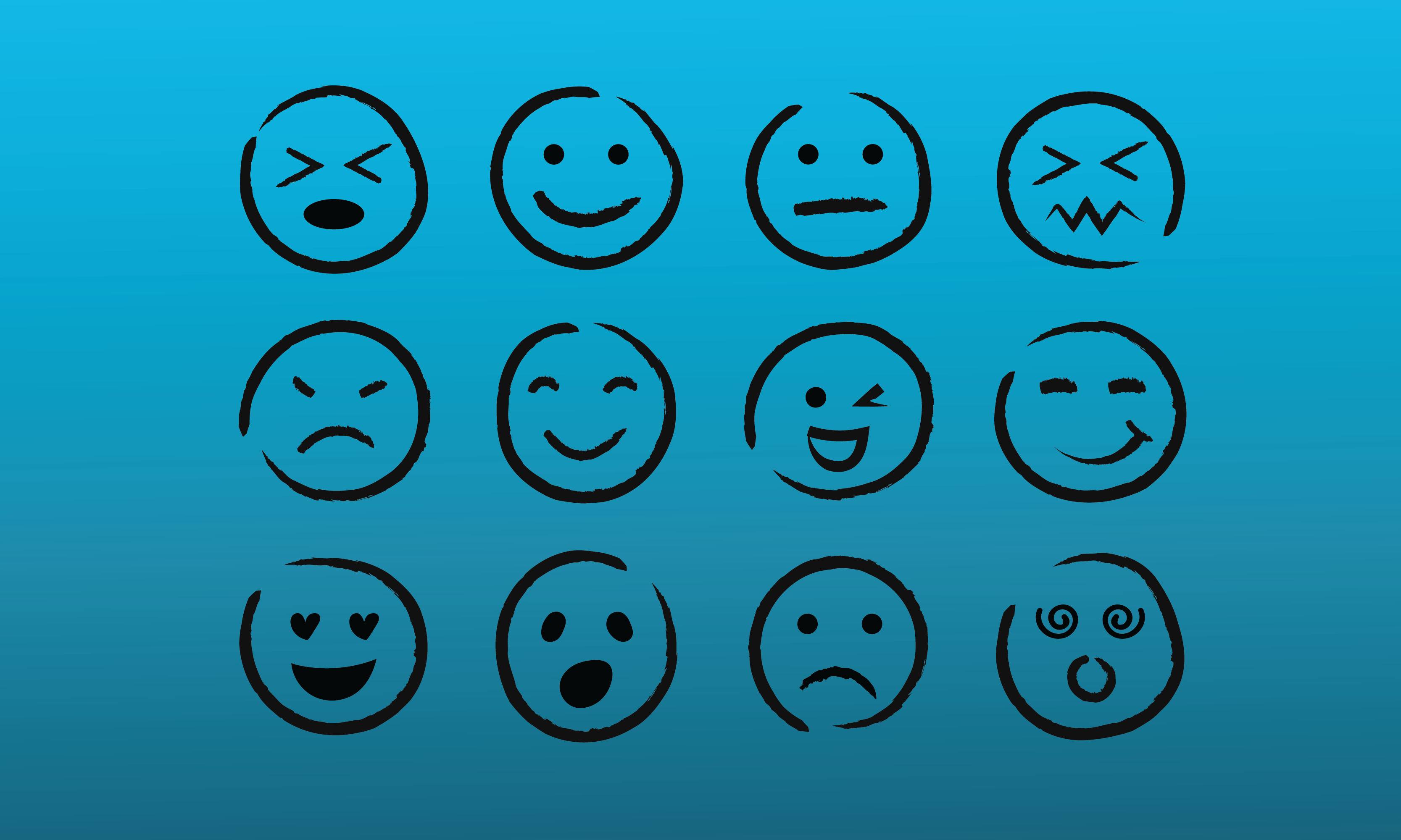
Valeria Pfeifer is a cognitive scientist at the University of Arizona. She is one of a small group of researchers who has studied how emojis affect our thinking. She tells me that my newfound joy makes sense. Emojis “convey this additional complex layer of meaning that words just don’t really seem to get at,” she says. Many a word nerd has fretted that emojis are making us—and our communication—dumber. But Pfeifer and other cognitive scientists and linguists are beginning to explain what makes them special.Source: Your 🧠 On Emoji | NautilusIn a book called The Emoji Code, British cognitive linguist Vyvyan Evans describes emojis as “incontrovertibly the world’s first truly universal communication.” That might seem like a tall claim for an ever-expanding set of symbols whose meanings can be fickle. But language evolves, and these ideograms have become the lingua franca of digital communication.
[…]
Perhaps the first study of how these visual representations activate the brain was presented at a conference in 2006.1 Computer scientist Masahide Yuasa, then at Tokyo Denki University in Japan, and his colleagues wanted to see whether our noggins interpret abstract symbolic representations of faces—emoticons made of punctuation marks—in the same way as photographic images of them. They popped several college students into a brain scanning machine (they used functional magnetic resonance imaging, or fMRI) and showed them realistic images of happy and sad faces, as well as scrambled versions of these pictures. They also showed them happy and sad emoticons, along with short random collections of punctuation.
The photos lit up a brain region associated with faces. The emoticons didn’t. But they did activate a different area thought to be involved in deciding whether something is emotionally negative or positive. The group’s later work, published in 2011, extended this finding, reporting that emoticons at the end of a sentence made verbal and nonverbal areas of the brain respond more enthusiastically to written text.2 “Just as prosody enriches vocal expressions,” the researchers wrote in their earlier paper, the emoticons seemed to be layering on more meaning and impact. The effect is like a shot of meaning-making caffeine—pure emotional charge.
Hacking the vagus nerve
It looks like electric stimulation of the vagus nerve using something like a TENS machine could help with everything from obesity and depression to Long Covid.
One of the universities local to me is leading some of this work, and they have a page about it here.
From plunging your face into icy water, to piercing the small flap of cartilage in front of your ear, the internet is awash with tips for hacking this system that carries signals between the brain and chest and abdominal organs.Source: The key to depression, obesity, alcoholism – and more? Why the vagus nerve is so exciting to scientists | The Guardian[…]
Meanwhile, scientific interest in vagus nerve stimulation is exploding, with studies investigating it as a potential treatment for everything from obesity to depression, arthritis and Covid-related fatigue. So, what exactly is the vagus nerve, and is all this hype warranted?
The vagus nerve is, in fact, a pair of nerves that serve as a two-way communication channel between the brain and the heart, lungs and abdominal organs, plus structures such as the oesophagus and voice box, helping to control involuntary processes, including breathing, heart rate, digestion and immune responses. They are also an important part of the parasympathetic nervous system, which governs the “rest and digest” processes, and relaxes the body after periods of stress or danger that activate our sympathetic “fight or flight” responses.
[…]
Search “vagus nerve hacks” on TikTok, and you’ll be bombarded with tips ranging from humming in a low voice to twisting your neck and rolling your eyes, to practising yoga or meditation exercises.
Researchers who study the vagus nerve are broadly sceptical of such claims. Though such techniques may help you to feel calmer and happier by activating the autonomic nervous system, the vagus nerve is only one component of that. “If your heart rate slows, then your vagus nerve is being stimulated,” says Tracey. “However, the nerve fibres that slow your heart rate may not be the same fibres that control your inflammation. It may also depend on whether your vagus nerves are healthy.”
Similarly, immersing your face in cold water may also slow down your heart rate by triggering something called the mammalian dive reflex, which also triggers breath-holding and diverts blood from the limbs to the core. This may serve to protect us from drowning by conserving oxygen, but it involves sympathetic and parasympathetic responses.
Electrical stimulation may hold greater promise though. One thing that makes the vagus nerves so attractive is surgical accessibility in the neck. “It is quite easy to implant some device that will try to stimulate them,” says Dr Benjamin Metcalfe at the University of Bath, who is studying how the body responds to electrical vagus nerve stimulation. “The other reason they’re attractive is because they connect to so many different organ systems. There is a growing body of evidence to suggest that vagus nerve stimulation will treat a wide range of diseases and disorders – everything from rheumatoid arthritis through to depression and alcoholism.”
Reality and the templated life
This article reviews a book entitled A Web of Our Own Making by Antón Barba-Kay which reminded me a lot of an issue of Audrey Watters' Second Breakfast newsletter about the templated body.
What does it mean for there to be multiple, constructed realities. When everyone has a smartwatch and is tracking everything, does that make their life both qualitatively and quantitatively different?

Some of these observations, though apt, aren’t exactly new — that the possibility of tracking our steps for so-called health reasons distorts our relationship with a simple country walk, that the fundamentally data-driven nature of smartphone culture “is such as to translate larger human questions about how to live into technical puzzles that may be ‘problem-solved,’” that Twitter timelines and Instagram feeds have become a saccharine way of capturing our limited and precious attention by distracting us from the less immediately rewarding elements of being human.Source: How the Internet obeys you | The New AtlantisBut the fusillade intensity with which Barba-Kay produces these inconvenient truths renders them impossible to ignore; from the details we start to perceive, little by little, the devil. As Barba-Kay writes, “digital technology is training us not simply to a new sense of what is real and really good, but to a new understanding of the contrasts within which we see that reality.” In other words, our awareness of what the virtual world cannot do has made us hungrier for those elements of reality from which we have not yet become alienated.
If reality is changing, it is because, for better and for worse, our lives are increasingly determined by one specific vision of human ingenuity: a vision that valorizes those elements of human life we freely choose (or think we do) over those we once saw as given to us — our bodies, our families, our communities. Digital culture functions today as the Enlightenment cosmopolis once did: as a fantasy in which society reshapes itself along the lines of affinity.
[…]
“Where once it was occasionally possible to opt out of ‘reality’ (by taking drugs, say),” Barba-Kay writes in the book’s perhaps most chilling line, “it is now increasingly necessary to think about how to opt in to it.” And we need to. It may be the most important decision we make in our lives.
Temporarily Abled
This blog post which reflects on Cindy Li’s pithy quotation that “we’re all just temporarily abled”. I’m recovering from a rib injury sustained on holiday, so I feel the author’s pain. Hopefully it won’t take me months to recover, but it’s impacting my exercise regime and mental outlook.
It reminded me of a post on the Microsoft Design blog called Kill Your Personas which dives into temporarily disabilities. Definitely worth a read.
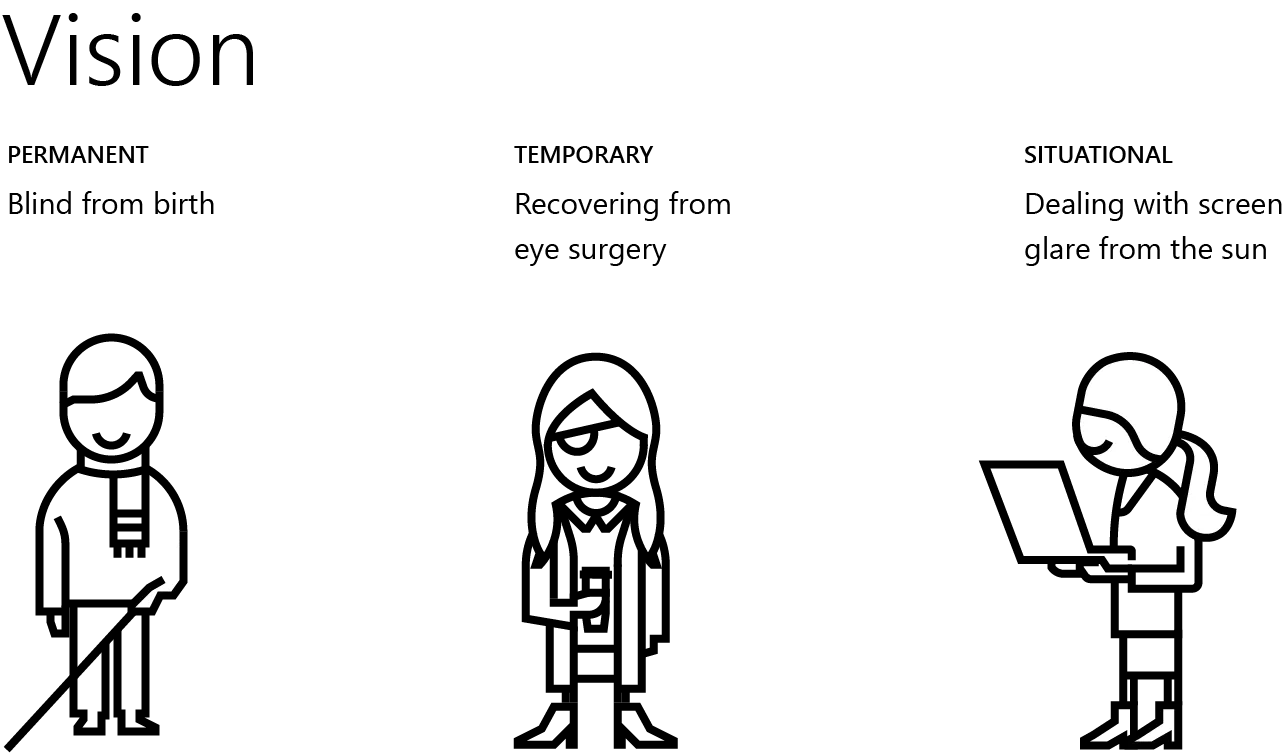
June 6th I was on vacation at the beach with my family and tried something that, looking back now, maybe I’m too old for. And I injured my knee.Source: “We’re All Just Temporarily Abled” | Jim Nielsen’s Blog[…]
That was almost three months ago now. I’m still limping. It’s getting better but it’s slow. The doctor told me, “Just be aware: this isn’t days or weeks recovery. This is months.”
Since then, I’ve tried to make the best of summer while kids are out of school but my mobility has been limited.
Through all of it, I’ve found myself noticing “accessibility” helpers more than ever before: that railing on the stairs, that ramp off to the side of the building, that elevator tucked away in the back.
All things I rarely noticed before but have since become vital.
And that phrase plays on repeat in my head — “we’re all just temporarily abled”.
[…]
I suppose it’s easy to misunderstand ability as a binary thing. But now I’m understanding more how fluid it is, as it inevitably comes in and out of each of our lives — “100% of people” in their lifetimes.
In classic human fashion, it’s one of those things you take for granted until it’s gone.
The only way to outlaw encryption is to outlaw encryption
An enjoyable take by The Register on the UK’s Online Safety Bill. I was particularly interested by the link to Veilid, a new secure peer-to-peer network for apps which is like the offspring of IPFS and Tor.
Many others have made the point about how much government ministers like the end-to-end encryption of their own WhatsApp communications. But they’d also like to break into, well… everyone else’s.
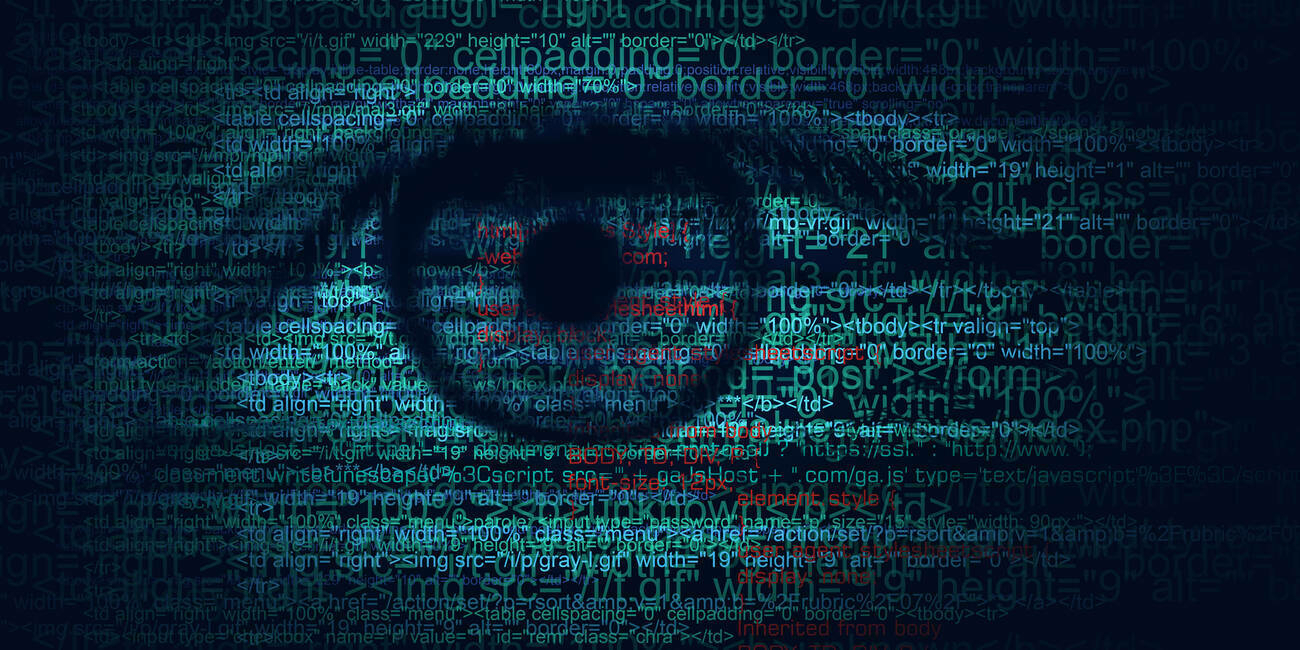
The official madness over data security is particularly bad in the UK. The British state is a world class incompetent at protecting its own data. In the past couple of weeks alone, we have seen the hacking of the Electoral Commission, the state body in charge of elections, the mass exposure of birth, marriage and death data, and the bulk release of confidential personnel information of a number of police forces, most notably the Police Service Northern Ireland. This was immediately picked up by terrorists who like killing police. It doesn't get worse than that.Source: Last rites for UK’s ridiculous Online Safety Bill | The RegisterThis same state is, of course, the one demanding that to “protect children,” it should get access to whatever encrypted citizen communication it likes via the Online Safety Bill, which is now rumored to be going through British Parliament in October. This is akin to giving an alcoholic uncle the keys to every booze shop in town to “protect children”: you will find Uncle in a drunken coma with the doors wide open and the stock disappearing by the vanload.
[…]
It is just stupidity stacked on incompetence balanced on political Dunning Krugerism, and the advent of Veilid drowns the lot in a tidal wave of foetid futility. What can a government do about a framework? What can it do about open source?
[…]
The only way to outlaw encryption is to outlaw encryption. Anything less will fail, as it is always possible in software to create kits of parts, all legal by themselves, that can be linked together to provide encryption with no single entity to legislate against. Our industry is fully aware of this. Criminals know it too. Ordinary people will learn it as well, if they have to. This information is free to everyone – except the politicians, it seems. For them, reality is far too expensive.
On 'Executive Function Theft'
This post by Abigail Goben popped up in several places and is one of those that gives a name to someone most people will recognise. It’s an important differentiation on what is often called ‘care work’ as it highlights how something important is taken when repetitive, administrative work is outsourced to other humans.

Executive Function Theft (EFT) is the deliberate abdication of decision-making, tasks, and responsibilities that are perceived as administrative or repetitive, of lesser importance, or aren’t pleasant or shiny, to another person, with the result that the receiving person’s executive function becomes so exhausted that they are unable to participate in, contribute to, or enjoy higher level efforts.Source: Executive Function Theft | Hedgehog Librarian[…]
In the workplace, an example of EFT often plays out in the inequality of service labor, and I will specifically use academic service work here as it is my current workplace. Think of the people who end up with more than their share of administrative maintenance tasks — such as organizing get well cards, scheduling workshops, or taking notes. Consider the colleague who has a list of committee appointments a yard long and has just gotten a request to be on Another! Important! (is it?) Committee. These individuals may not be doing these tasks strictly because it is their job responsibility, but because they see a need to be filled or have been asked or tasked with taking on more service that they feel they cannot turn down. And notice how those tasks so often fall to the same group of people — especially when we get to any form of implementation or ongoing commitment rather than the “fun” ideation phase. One way to calculate these service loads would be to count the number of committees and task forces held by and expected of various individuals — who gets a pass and who gets penalized if they don’t say yes.
Quite often there’s a gendered component as to who is tasked with these additional service responsibilities — the office housekeeping as well as the care tasks of the workplace.
[…]
I will admit to never having been able to read Cal Newport’s Deep Work all the way through — I got too irritated — but I would point to his dismissive naming of the idea of “shallow work”, which he defines as logistical and often repetitive tasks, such as writing short emails. Newport recommends entirely stopping or poorly performing that work; I read this as encouraging readers to commit EFT against others around them. Too often the dump off of what are critical responsibilities is not to a specifically tasked and appreciated administrator but instead onto the junior, female, minoritized, non-tenure track, or precarious employees. It’s the maintenance work of keeping the workplace going and we do not appreciate the maintainers. Similarly thinking about EFT in the workplace, I was reminded of the guy who got famous with the Four Hour Workweek book and how we were all just supposed to outsource things to nameless underpaid gig workers. Notably, when looking for a summary of that book, I found an article by Cal Newport praising it.
Image: Uday Mittal
Why anxious people find it difficult to control their emotions
This explains a lot. Basically, studies have found that a specific part of the brain behaves differently in anxious individuals, and this difference might explain why they struggle with emotional control. It’s like a traffic jam in the brain that makes it harder for the signals to get through, leading to difficulties in managing emotional reactions.
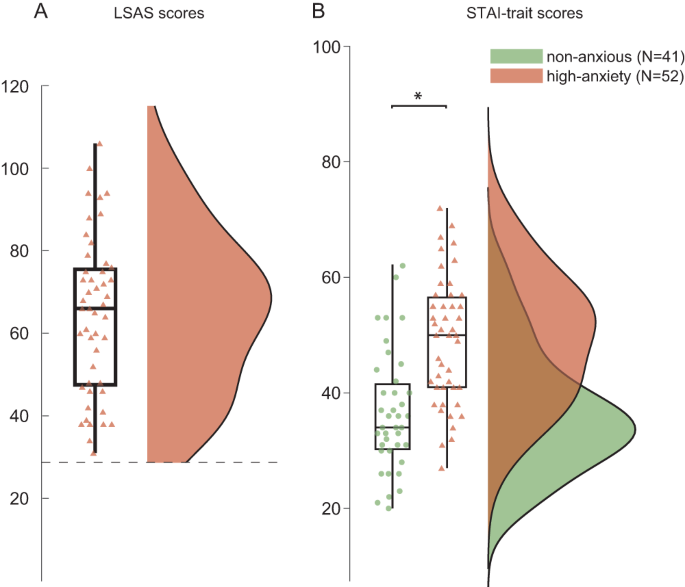
Anxious individuals consistently fail in controlling emotional behavior, leading to excessive avoidance, a trait that prevents learning through exposure. Although the origin of this failure is unclear, one candidate system involves control of emotional actions, coordinated through lateral frontopolar cortex (FPl) via amygdala and sensorimotor connections. Using structural, functional, and neurochemical evidence, we show how FPl-based emotional action control fails in highly-anxious individuals. Their FPl is overexcitable, as indexed by GABA/glutamate ratio at rest, and receives stronger amygdalofugal projections than non-anxious male participants. Yet, high-anxious individuals fail to recruit FPl during emotional action control, relying instead on dorsolateral and medial prefrontal areas. This functional anatomical shift is proportional to FPl excitability and amygdalofugal projections strength. The findings characterize circuit-level vulnerabilities in anxious individuals, showing that even mild emotional challenges can saturate FPl neural range, leading to a neural bottleneck in the control of emotional action tendencies.Source: Anxious individuals shift emotion control from lateral frontal pole to dorsolateral prefrontal cortex | Nature Communications
Jobs, AI, and human worth
I’m sharing this article to make a comment about the framing for these kinds of things. The article is an extract from a book by David Runciman, and implicitly links human worth to jobs.
Part of the existential dread of AI replacing humans is that, if your job is your life, then who are you without the doing? Instead of hand-wringing about robots and machines, perhaps our time is better spent figuring out who we are and how we want to flourish.
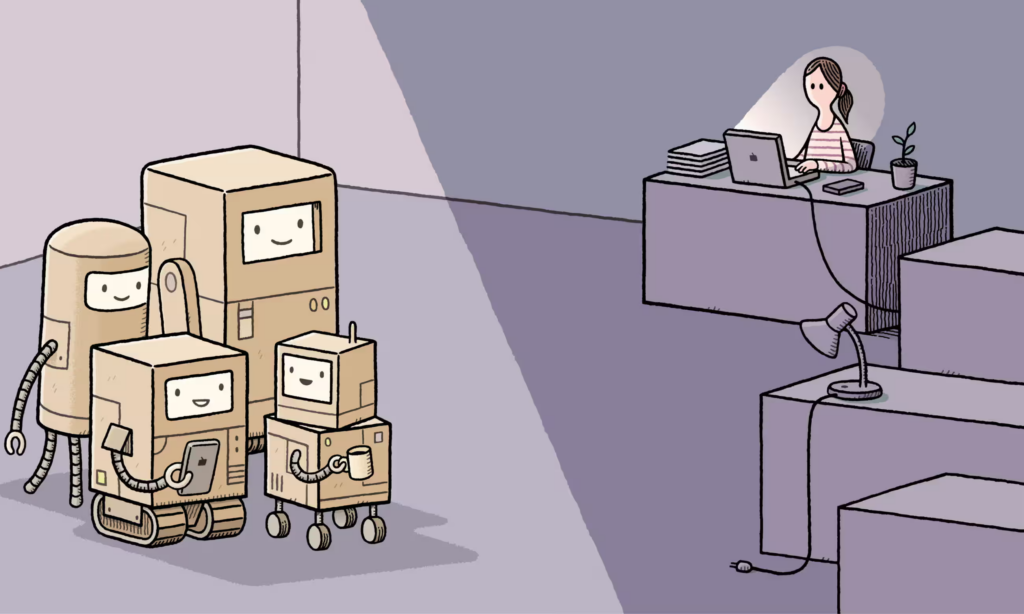
In the slew of reports published in the 2010s looking to identify which jobs were most at risk of being automated out of existence, sports officials usually ranked very high up the list (the best known of these studies, by Carl Benedikt Frey and Michael Osborne in 2017, put a 98% probability on sports officiating being phased out by computers within 20 years). Here, after all, is a human enterprise where the single most important qualification is an ability to get the answer right. In or out? Ball or strike? Fair or foul? These are decisions that need to be underpinned by accurate intelligence. The technology does not even have to be state-of-the-art to produce far better answers than humans can. Hawk-Eye systems have been outperforming human eyesight for nearly 20 years. They were first officially adopted for tennis line calls in 2006, to check cricket umpire decisions in 2009 and, more recently, to rule on football offsides.Source: The end of work: which jobs will survive the AI revolution? | The Guardian[…]
Efficiency – even accuracy – turns out not to be the main requirement of the organisations that employ people to give decisions during sports games. They are also highly sensitive to appearance, which includes a wish to keep their sport looking and feeling like it’s still a human-centred enterprise. Smart technology can do many things, but in the absence of convincingly humanoid robots, it can’t really do that. So actual people are required to stand between the machines and those on the receiving end of their judgments. The result is more work all round.
[…]
How things look isn’t everything. There are significant parts of every organisation where appearance doesn’t matter so much, in the backrooms and maybe even the boardrooms that the public never gets to see. Behind-the-scenes technical knowledge that underpins the performance of public-facing tasks is likely to be an increasingly precarious basis for reliable employment. This is true of many professions, including accountancy, consultancy and the law. There will still be lots of work for the people who deal with people. But the business of gathering data, processing information and searching for precedents can now more reliably be done by machines. The people who used to undertake this work, especially those in entry-level jobs such as clerks, administrative assistants and paralegals, might not be OK.
[…]
History offers a partial guide to what might happen. Worries about automation displacing human workers are as old as the idea of the job itself. The Industrial Revolution disrupted many kinds of labour – especially on the land – and undid entire ways of life. The transition was grim for those who had to switch from one mode of subsistence existence to another. Yet the end result was many more jobs, not fewer. Factories brought in machines to do faster and more reliably what humans used to do or could never do at all; at the same time, factories were where the new jobs appeared, involving the performance of tasks that were never required before the coming of the machines. This pattern has repeated itself time and again: new technology displaces familiar forms of work, causing massively painful disruption. It is little consolation to the people who lose their jobs to be told that soon enough there will be entirely new ways of earning a living. But there will.
Did people in the past look older for their age?
I’m 42 but look much younger than my father did at his age. And I’m sure that he looked younger than my grandfather did at his age. This is an interesting article about why.
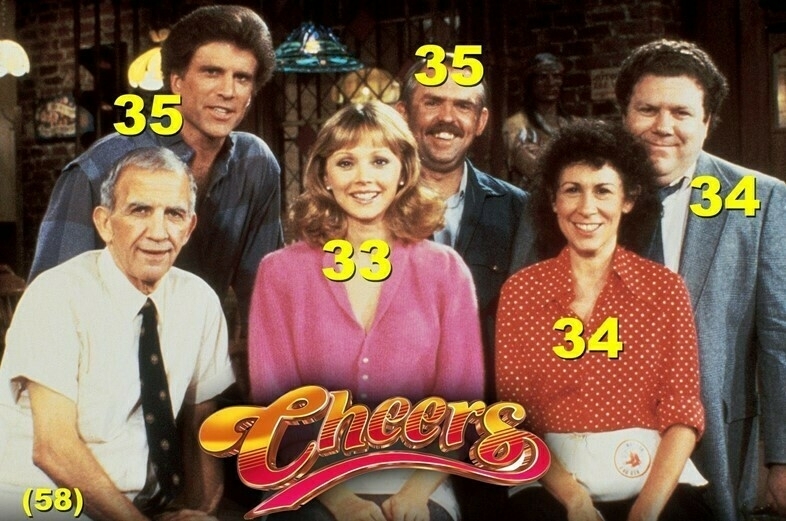
There’s a meme that makes the rounds every so often. It’s a group shot of the cast of 80s sitcom Cheers, with the ages of each actor displayed on the image. Every time it comes back around, people express surprise and disbelief that this group of what looks to be middle-aged folk are actually in their twenties and thirties. With his greying moustache and receding hairline, John Ratzenberger looks far older than what we might now imagine a 30-something man to look like – current 35-year-old actors Michael Cera and Nicholas Braun, for example, look significantly younger in comparison.Source: Why did people in the past look so much older? | Dazed[…]
While factors like diet, skincare and aesthetic procedures can make us physically look younger – hairstyles, make-up and fashion also play a role in how youthful we appear. While someone with 2023-esque micro bangs may scream young to us, we associate photos of 80s hairstyles and big shoulder pads with being older, even if the person in the image is the same age as us. This is partly because of how we consider trendy hairstyles and fashion of that time to be outdated.
[…]
Today we might be obsessed with preserving our youth, but this wasn’t always the case. In past decades, popular trends often existed to make young people appear more sophisticated and bold. “The dramatic nature of [80s] hairstyles often conveyed a sense of confidence and authority, which could be associated with older individuals,” hairdresser Gwenda Harmon says. “Certain hairstyles of the 1980s actually made some youth appear older due to their bold and sophisticated nature.”
Ask culture vs guess culture
I’ve seen this culture clash outlined before, although I wouldn’t necessarily use the labels ‘ask’ and ‘guess for the different approaches. I was raised by a mother who very much (still!) relies on inference to live her life. I’ve found being much more direct useful in living my own.
(I’d also note that the author seems to be playing fast-and-loose with the term ‘Western’ to mean ‘American’ here as British people are much more likely to be guessers than askers in my experience.)
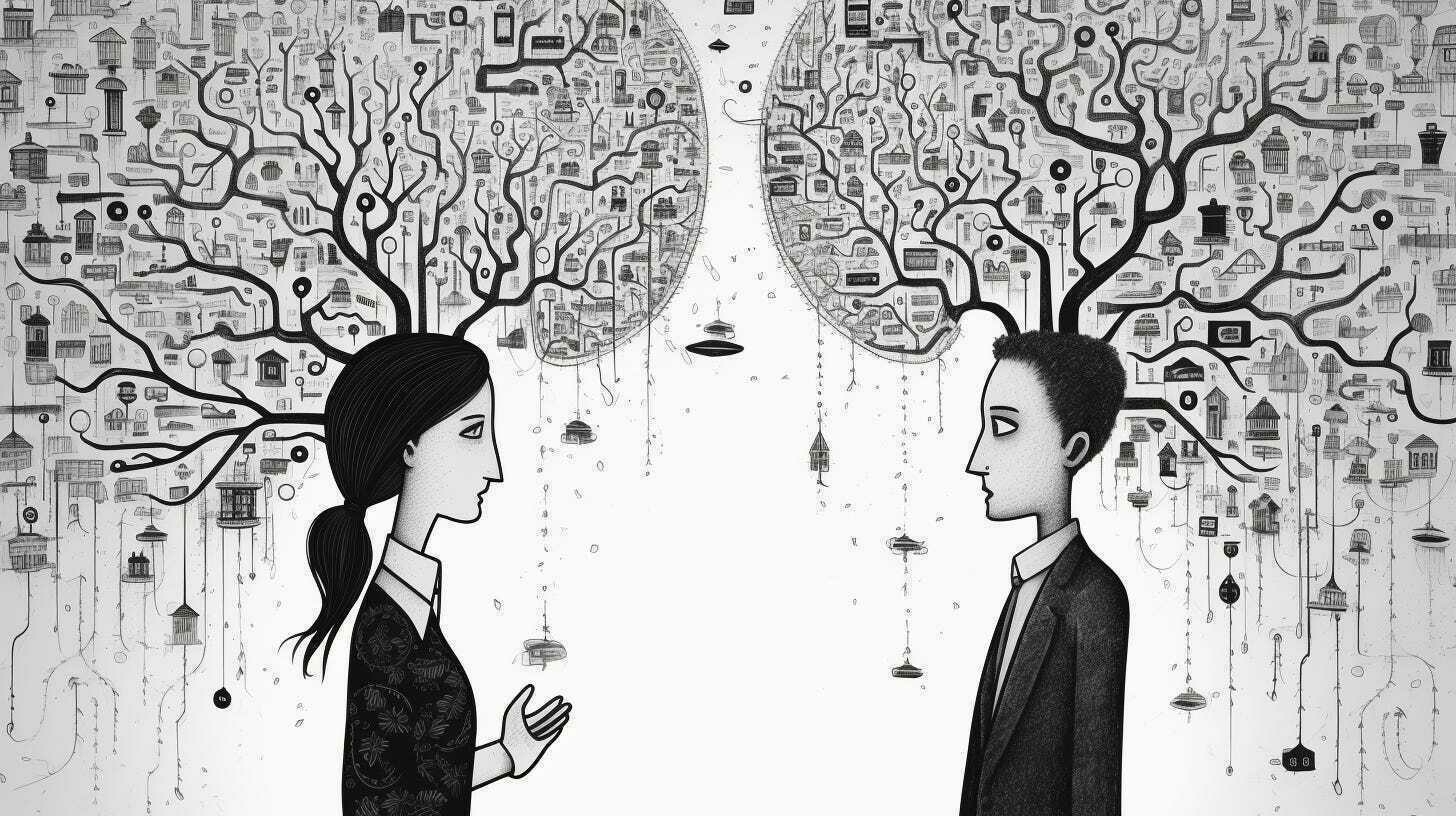
Ask culture and guess culture are vastly different in behavior and expectations. Here are some highlights:Source: Ask vs guess culture | Tech and TeaAsk culture expectations
Guess culture expectations
- Ask for what you want, even if it seems out of reach or like a big unreasonable request
- Take care of your own needs, and others will take care of theirs
- It’s fine to make requests that people will probably say no to
- People say yes to requests that you truly feel good about, say no to ones they don’t
[...]
- Only ask for something if you’re already pretty sure the other person will say yes
- Read an abundance of indirect contextual cues to determine if your request is reasonable to make
- It’s rude to put someone in a position where they have to say no to you
- If the appropriate feelers and context are set, you will never have to make your request at all.
If you’re more a guess-culture person, asking people for help without knowing their circumstances can feel rude or intrusive. Broadcasting publicly your need for help can feel awkward and vulnerable.
[…]
Western society is very much ask culture. A classic example can be found in proverbs. “A squeaky wheel gets the grease” is an American proverb, enforcing the ideas of individualism and that asking for what you want will benefit you.
Life in 2050
Futurist Stowe Boyd imagines life in 2050, through three scenarios. I can’t help but think that ‘Collapseland’ (excerpted below) is the most likely outcome. Sadly.
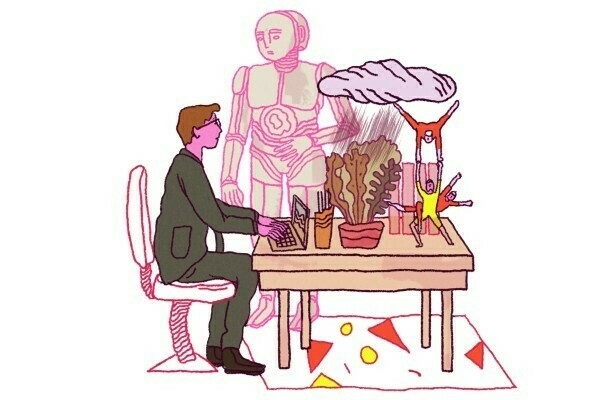
Collapseland is where everything goes pear shaped. Dithering by governments and corporations has allowed climate change to push the world into increased heat, drought, and violent weather. The Human Spring of the 2020s led to a conservative backlash and a suppression of the movement itself. It also led to a suppression of advancements in AI, since it became associated with the science orientation of the movement.Source: What Will a Corporation Look Like in 2050? | WIREDBut governments and corporations get their act together in the late 2020s and 2030s to avert an extinction event via the global adoption of solar. However, this only comes after a serious ecological catastrophe has occurred. Inequality remains unchecked, and the poor become much poorer.
Collapseland businesses are much like businesses of 2015. Most efforts are directed toward basic requirements — like desalinating water, relocating people away from low-lying or drought stricken areas, and struggling with food production challenges. As a result, little innovation has taken place. It’s no different from the company you work for today, except longer hours, fewer co-workers, less pay, and much more dust. To increase profits, corporations have cut staff and forced existing workers to work harder.
Context is everything, especially with books
When I was younger I slogged through some terrible books that, because they were deemed ‘classics’, I thought I should read. Thankfully, I’m a lot more ruthless with non-fiction and, in fact, these days I’m happy to give up on a book I’m not finding enjoyable/relevant after 50 pages.
The interesting thing, though, is that it’s always worth coming back to books. Sometimes, a change in interest, age, or context can completely change your relationship with them.

I used to believe that every book has an objective value. And I used to believe that this value is fixed and universal.Source: Is this a good book for me, now? | Mary Rose CookNow, I believe it’s much more useful to say something in this form: this book has this value to this person in this context.
[…]
The idea that a book’s value is best judged alongside the notional reader and their current context has some corollaries:
First, reading the books that your heroes cite as important will not necessarily be rewarding. If you admire Bret Victor for his work on computing interfaces, only some of his library will be high value to you because his library also includes lots of books that have nothing to do with UI.
Second, yes, it’s likely that “great books” may be high value in some more universal sense that is independent of reader and context. And, yes, this high value may come from something inherent in the quality of the books, rather than from the fact that they are about themes that are more relevant to more people. Yes, I probably wouldn’t dispute this. But I suspect that relevance to person and context is a better guide to what to read.
Third, book recommendation systems based on your reading history can be helpful, but only so much. You, now, are not represented by your reading history. You’ve changed. Making recommendations based on books you read twenty years ago might produce good books for you, now. But probably not.
Image: Thought Catalog
Using AI to aid with banning books is another level of dystopia
I’m very much optimistic about the uses of AI tools such as LLMs to help with specific tasks. See the latest post on my personal blog, for example.
However, what I’m concerned about is AI decision-making. In this case, a crazy law is being implemented by people who haven’t read the books in questions who outsource the decision to a language model that doesn’t really understand what’s being asked of it.
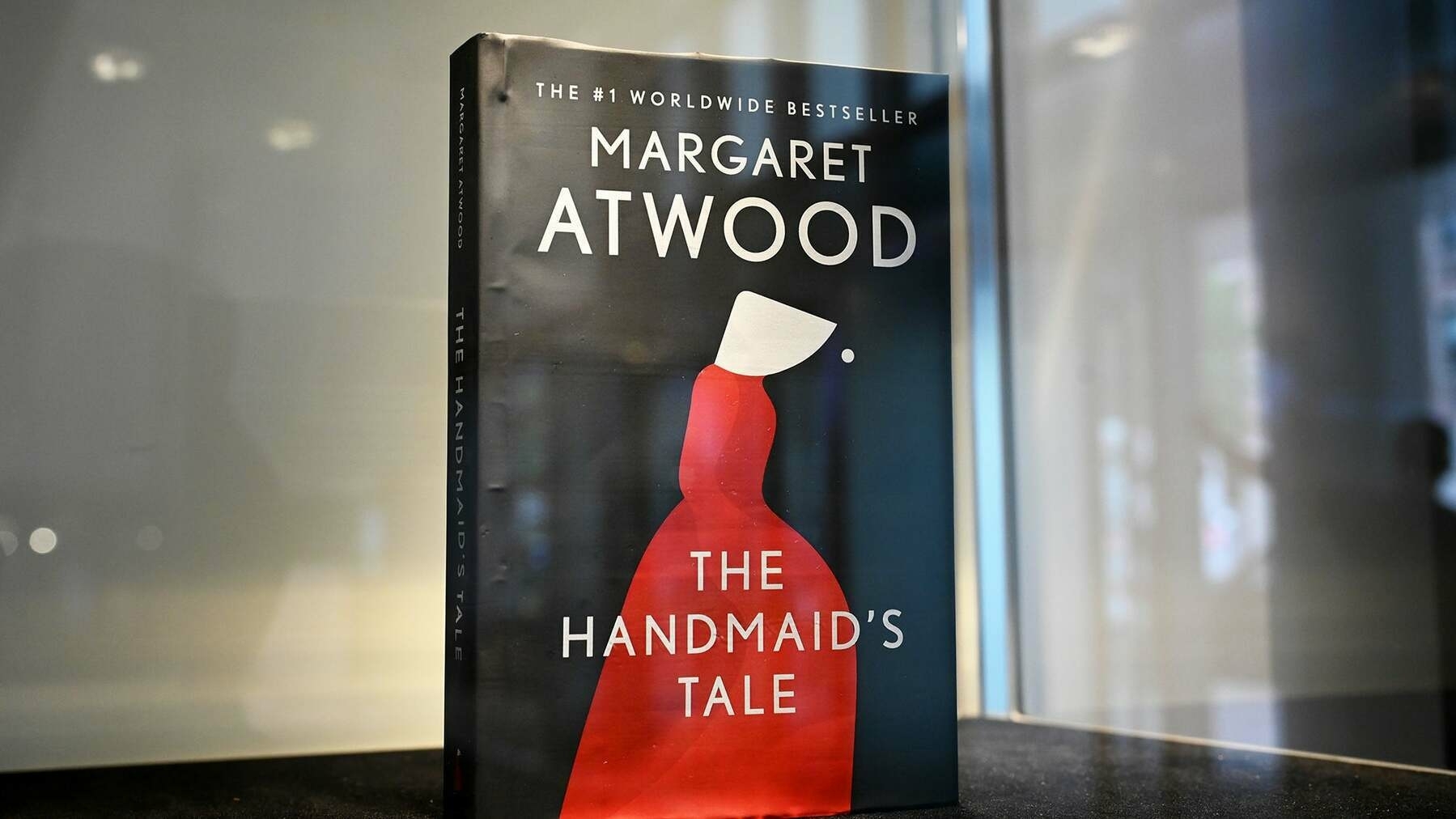
According to an August 11 article in the Iowa state newspaper The Gazette, spotted by PEN America, the Mason City Community School District recently removed 19 books from its collection ahead of its quickly approaching 2023-24 academic year. The ban attempts to comply with a new law requiring Iowa school library catalogs to be both “age appropriate” and devoid of “descriptions or visual depictions of a sex act.” Speaking with The Gazette last week, Mason City’s Assistant Superintendent of Curriculum and Instruction Bridgette Exman argued it was “simply not feasible to read every book and filter for these new requirements.”Source: School district uses ChatGPT to help remove library books | Popular Science“Frankly, we have more important things to do than spend a lot of time trying to figure out how to protect kids from books,” Exman tells PopSci via email. “At the same time, we do have a legal and ethical obligation to comply with the law. Our goal here really is a defensible process.”
According to The Gazette, the resulting strategy involved compiling a master list of commonly challenged books, then utilizing a previously unnamed “AI software” to supposedly provide textual analysis for each title. Flagged books were then removed from Mason City’s 7-12th grade school library collections and “stored in the Administrative Center” as educators “await further guidance or clarity.” Titles included Alice Walker’s The Color Purple, Margaret Atwood’s The Handmaid’s Tale, Toni Morrison’s Beloved, and Buzz Bissinger’s Friday Night Lights.
Income Level 4
I’ve had reason to reflect on how easy my life is recently. Not only am I a straight, middle-aged, able-bodied white guy but, according to Gapminder, I’m living life in a prosperous country on ‘Level 4’.
Worth pondering.
People at Income Level 4 earn more than $32 a day. At this Income Level, we find thee richest billion on the planet, who work in jobs that typically require at least 12 years of education — something those on the lower Income Levels cannot currently aspire to.Source: Income Level 4 | GapminderPeople at this Income Level are able to buy consumer goods, fly abroad with their families on holiday, and eat out at restaurants. None of these luxuries are available to people living at Levels 1 – 3, but are considered normal by most at Level 4.
The food they eat is often highly nutritious and diverse, as well as being rich in protein and vitamins. People at Level 4 can even buy pre-prepared food to save them time on cooking.
At this Income Level, not only electricity but also Internet connections are extremely reliable. Nearly every home has at least one TV and computer, and kitchens are equipped with stoves, ovens, toasters, and microwaves. Homes also have baths and showers installed with both hot and cold water — another luxury that is extremely rare at any other Income Level.
Instead of bikes and mopeds, people living at Level 4 usually own a car — sometimes even two per family. Public transport is also organized and readily available to everybody.
Perhaps most importantly, life at Level 4 is more secure than it is for people at levels 1 – 3. Not only are doors and windows locked securely, valuable property is usually insured against damage or theft. People also have bank accounts, access to credit, and pension funds for when they retire. Healthcare is also readily available to people living at Level 4, with basic medication available at affordable rates from local shops, and advanced and emergency medical treatment available locally to almost everybody.
AI sports recruitment
A few weeks ago, I watched part of the EA Sports FC 24 announcement video with my son. The CEO of Electronic Arts mentioned something that anyone who’s been paying attention already knows: games like FIFA (of which EA Sports FC is the spiritual successor) has transformed football.
There’s a symbiotic link between how people play football and how people play football video games. What’s less easy to spot is how talent is identified, nurtured, and shaped. That’s where articles like this one about AI in the behind-the-scenes processes comes in.
As someone with two very sporty kids, and one of whom is potentially on a pathway to professional football, this is fascinating to me.
There's no doubt that professional sports have been primed for the potential impact of artificial intelligence. Innovations have the potential to transform the way we consume and analyze games from both an administrative and fan standpoint. For soccer specifically, there are opportunities for live game analytics, match outcome modeling, ball tracking, player recruitment, and even injury predicting — the opportunities are seemingly endless.Source: Will AI revolutionize professional soccer recruitment? | Engadget[…]
Luis Cortell, senior recruiting coach for men’s soccer for NCSA College Recruiting, is a little less bullish, but still believes AI can be an asset. “Right now, soccer involves more of a feel for the player, and an understanding of the game, and there aren’t any success metrics for college performance," he said. “While AI won’t fully fill that gap, there is an opportunity to help provide additional context.”
At the same time, people in the industry should be wary of idealizing AI as a godsend. “People expect AI to be amazing, to not make errors or if it makes errors, it makes errors rarely,” Shapiro said. The fact is, predictive models will always make mistakes but both researchers and investors alike want to make sure that AI innovations in the space can make “fewer errors and less expensive errors” than the ones made by human beings.
[…]
The MLS said in a statement that ai.io’s technology “eliminates barriers like cost, geography and time commitment that traditionally limit the accessibility of talent discovery programs.” Felton-Thomas said it is more important to understand that ai.io will “democratize” the recruiting process for the MLS, ensuring physical skills are the most important metric when leagues and clubs are deciding where to invest their money. “What we’re looking to do is give the clubs a higher confidence level when they’re making these decisions on who to sign and who to watch.” By implementing the AI-powered app, recruitment timelines are also expected to be cut.
Secret family recipes (on the side of containers)
I love this 😂
In response to our call, 174 readers wrote in with stories of plagiarized family recipes. Hailing from New York to Nicaragua, from Auckland, New Zealand, to Baghpat, India, they prove that this is a global phenomenon. The majority of readers described devastating discoveries: They found supposedly secret recipes in the pages of famous cookbooks, and heard confessions from parents whose legendary dessert recipes came from the side of Karo Syrup bottles.Source: The Dirty Secret of ‘Secret Family Recipes’ | Gastro Obscura[…]
Several readers joked about family members threatening to take a secret recipe to the grave. To our surprise, we also received a story of a late-in-life confession:
My uncle was known around town as the “fudge man.” Every year, he would make pounds of it for Christmas parties, bake sales, and gifts. It was legendary—people would beg him for the recipe. When he was ill in the hospital, before he passed, his wife begged him for the recipe so she could keep his memory going. He replied, “It’s on the side of the marshmallow fluff container.”
–Jess Heller, Minnesota
Quake II remaster brings online LAN gaming
I can’t wait to play this. While I enjoy playing Doom Eternal by myself occasionally, LAN gaming the Quake II takes me back to being a teenager!
[embed]www.youtube.com/watch
In a surprise announcement at QuakeCon, publisher Bethesda Softworks announced the immediate availability of a light remaster of the classic first-person shooter Quake II, similar to the one for the first Quake that was released not that long ago.Source: Quake II gets a remaster for PC and consoles—and it’s exactly what it needs to be | Ars Technica[…]
You get a lot of content for 10 bucks; the package includes the game’s original campaign, both previously released expansions, Quake II 64, and a new campaign called Call of the Machine with 28 levels developed by Machine Games (the team behind the recent Wolfenstein games).
There’s also split-screen local multiplayer (up to four players), as well as LAN and online multiplayer.
Introducing Homo naledi
Science is awesome. I love the way that we continue to rediscover and reinterpret what it means to be human based on archaeology and scientific theories.

Using an unparalleled range of tests, experts are investigating whether a group of ‘ape-men’ succeeded in creating a complex human-like culture - potentially thousands of years before our own species, Homo sapiens, managed to do so.Source: Scientific discovery casts doubt on our understanding of human evolution | The IndependentAdding to the mystery is the fact that the now long-extinct species behaved in several key ways like modern humans - and yet appears to have been able to do that with brains which were only a third the size of ours.
The evidence assembled so far is beginning to suggest that these small-brained ‘ape-men’ may have been able to do seven remarkable things:
[...]
- Envisage an afterlife (in other words, a belief that some form of existence continues beyond death).
- Believe that an afterlife occurs in some sort of ‘underworld’, located beneath (rather than on or above) the world of the living. That implies that they may have developed some very embryonic sense of cosmology.
- Conceive the idea of physically burying their dead - in that ‘underworld’.
- Give grave goods to dead members of their community - an apparent act that implies that they may have believed that the dead would somehow be able to use them in an afterlife.
- Carry out potential rituals - specifically funerary meals - inside their ‘underworld’.
- Create rudimentary art (abstract designs) around the entrance to at least one of the burial chambers in that ‘underworld’.
- Plan some sort of relatively complex lighting system (either a succession of small fires and/or torches) to enable them to penetrate their ‘underworld’ and take their dead there.
“We know that what we’re discovering breaks totally new ground - and is therefore likely to be controversial. That’s why we are deploying every possible type of investigative technology to ensure that the maximum amount of additional evidence can be found,” said the leader of the Rising Star Cave investigation, National Geographic and University of Witwatersrand palaeoanthropologist, Professor Lee Berger, who with co-investigator, human evolution expert Professor John Hawks, has just published a detailed National Geographic book on the discoveries, entitled Cave of Bones.
Landmark ruling in climate trial
I’ve only been there once, but Montana is an absolutely beautiful place. And much like other places that people call home, those that live there want to keep it that way.
It’s really heartening to see youth-led action be successful in a court of law. I hope that this leads to more cases being brought around the world.
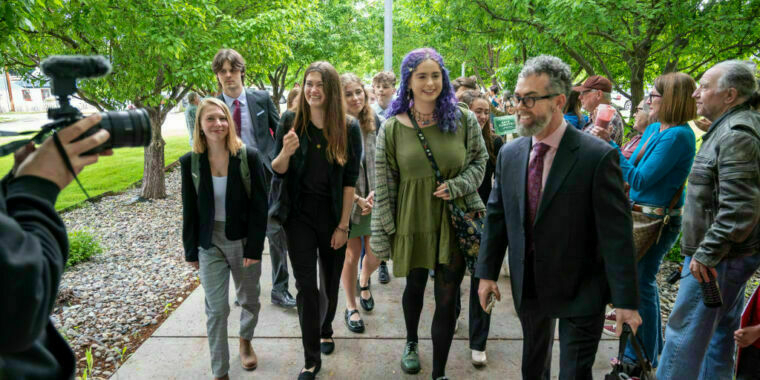
A Montana state court today sided with young people who sued the state for promoting the fossil fuel industry through its energy policy, which they alleged prohibits Montana from weighing greenhouse gas emissions in approving the development of new factories and power plants. This prohibition, 16 plaintiffs ages 5 to 22 successfully argued, violates their constitutional right to a "clean and healthful environment in Montana for present and future generations."Source: Montana loses fight against youth climate activists in landmark ruling | Ars TechnicaExperts previously predicted that a win for youths in Montana would set an important legal precedent for how courts can hold states accountable for climate inaction. The same legal organization representing Montana’s young plaintiffs, Our Children’s Trust, is currently pursuing similar cases in four other states, The Washington Post reported.
[…]
Montana tried to argue that adjusting its energy policy and other statutes would have “no meaningful impact or appreciable effect,” the Post reported, because climate change is a global issue. Montana Assistant Attorney General Michael Russell described the testimony as a “week-long airing of political grievances that properly belong in the Legislature, not a court of law,” according to the Post. Notably, the state did not meaningfully attempt to dispute climate science.
[…]
Experts told Scientific American that Montana’s emissions are significant given its population size, emitting in 2019 “about 32 million tons of carbon dioxide.” That’s “about as much as Ireland, which has a population six times larger,” Scientific American reported. Young people suing alleged that Montana had “never denied a permit for a fossil fuel project,” the Post reported.
